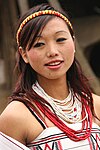Rongmei people
It has been suggested that this article be merged with Rongmei people. Reason: These are possibly duplicate articles formed from an improper undo of a rename-move (Discuss) Proposed since May 2024. |
 Kabui women | |
| Total population | |
|---|---|
| 170,800 (2011 Census)[citation needed][verification needed] | |
| Regions with significant populations | |
| Northeast India | |
| Languages | |
| Inpui language, Rongmei language (L1) Meitei language (L2)[1] | |
| Religion | |
| Christianity, Poupei Chapriak, Sanamahism, Tingkao Ragwang Chapriak[page needed][citation needed][verification needed] | |
| Related ethnic groups | |
| Meitei people, Zeme, Liangmai |
The Kabui people (also known as the Inpui people or the Rongmei people), are a Tibeto-Burman indigenous ethnic group in the Northeast Indian state of Manipur. They are recognised as a scheduled tribe (STs) by the Constitution of India.[2] They use Meitei language as their second language (L2) according to the Ethnologue.[3]
Some historians and anthropologists have earlier recorded them as Kabui along with Rongmei. They are listed as a Scheduled Tribe, in accordance with The Scheduled Castes and Scheduled Tribes Orders (Amendment) Act, 1976 Indian Constitution.[4][5] They celebrate festivals like Karing-ngei, Somdungnu, Tataaknu, and Muliaang.[6]
Eventually, under the leadership of Haipou Jadonang[7] and his successor Rani Gaidinliu,[8] the Rongmei rebelled against British rule in the 1930s.

See also
References
- ^ "Meitei | Ethnologue". Ethnologue. Archived from the original on 24 July 2019. Retrieved 3 May 2023.
- ^ "The Constitution (Scheduled Tribes): Order, 1950". Ministry of Law and Justice (India).
- ^ "Meitei | Ethnologue". Ethnologue. Archived from the original on 24 July 2019. Retrieved 3 May 2023.
- ^ "The Constitution (Scheduled Tribes)". Archived from the original on 20 September 2017. Retrieved 31 July 2016.
- ^ "Archived copy" (PDF). Archived from the original (PDF) on 11 October 2016. Retrieved 12 November 2019.
{{cite web}}: CS1 maint: archived copy as title (link) - ^ "Festival of Inpui Naga". Epao.
- ^ G. K. Ghosh (1 January 1992). Tribals and Their Culture in Assam, Meghalaya, and Mizoram. Ashish Publishing House. ISBN 978-81-7024-455-4. Retrieved 5 June 2013.
- ^ Kusumlata Nayyar (2002). Rani Gaidinliu. Ocean Books. ISBN 978-81-88322-09-1. Retrieved 12 June 2013.

